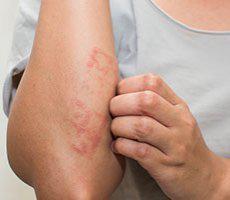What are mast cells?
Mast cells play a vital role in your immune system. They guard areas where your body is open to the outside environment — the places where you’re exposed to harmful substances — such as your skin, respiratory tract, gastrointestinal tract, and genitourinary system. They’re also found in organs and in most tissues in your body.
When mast cells encounter invaders, like bacteria and viruses, they release substances that activate the inflammatory response and attract other cells to the area to attack and destroy the harmful substance.
Mast cells also travel with antibodies that identify allergens. When an allergen is detected, mast cells release histamine and other chemicals that cause your allergy symptoms.
What is mast cell activation syndrome?
Mast cell activation syndrome occurs when mast cells are too easily activated to release their chemicals. As a result, they flood your system with substances, leading to unwanted symptoms and problems.
What symptoms might I develop if I have mast cell activation syndrome?
Mast cell activation syndrome can cause a wide range of symptoms and contribute to many different diseases.
These are some of the symptoms you may develop:
- Skin: Hives, itching, flushing, angioedema
- Respiratory: wheezing, congestion, trouble breathing
- Gastrointestinal: abdominal pain, cramps, diarrhea, constipation
- Neuropsychiatric: headache, anxiety, dizziness, forgetfulness, brain fog
- General: lethargy, fatigue
When you’re diagnosed with mast cell activation syndrome, you’ll have symptoms in two or more systems that either recur or are chronic.
Beyond your immediate symptoms, mast cells are recognized for their role in inflammatory diseases. Mast cell activation syndrome may be the underlying problem in multiple organ inflammatory disorder.
What triggers mast cell activation syndrome?
A variety of triggers can result in mast cells releasing their chemicals, including:
- Change in temperature
- Emotional or physical stress
- Exercise
- Food and beverages
- Odors (chemicals, perfumes)
- Insect stings
- Infections
- Mechanical irritation like friction
Medications, such as antibiotics and ibuprofen, may also trigger mast cell activation syndrome.
How is mast cell activation syndrome treated?
The first line of treatment for mast cell activation syndrome is to identify and avoid your triggers. Dr. Tolston works with you, helping you develop a method tracking potential triggers, then creating a plan to avoid them.
Dr. Tolston may also prescribe medications to help relieve your symptoms. For example, antihistamines, mast cell stabilizers, and leukotriene inhibitors are three classes of medications that can help.
It’s also important to carry self-injectable epinephrine with you in case you develop anaphylaxis. Anaphylaxis is a severe allergic reaction that makes it hard to breathe, makes your blood pressure drop, and can cause shock and death.
If you have persistent multisystem symptoms, call Allergy Asthma and Immunology on Madison or book an appointment online.








